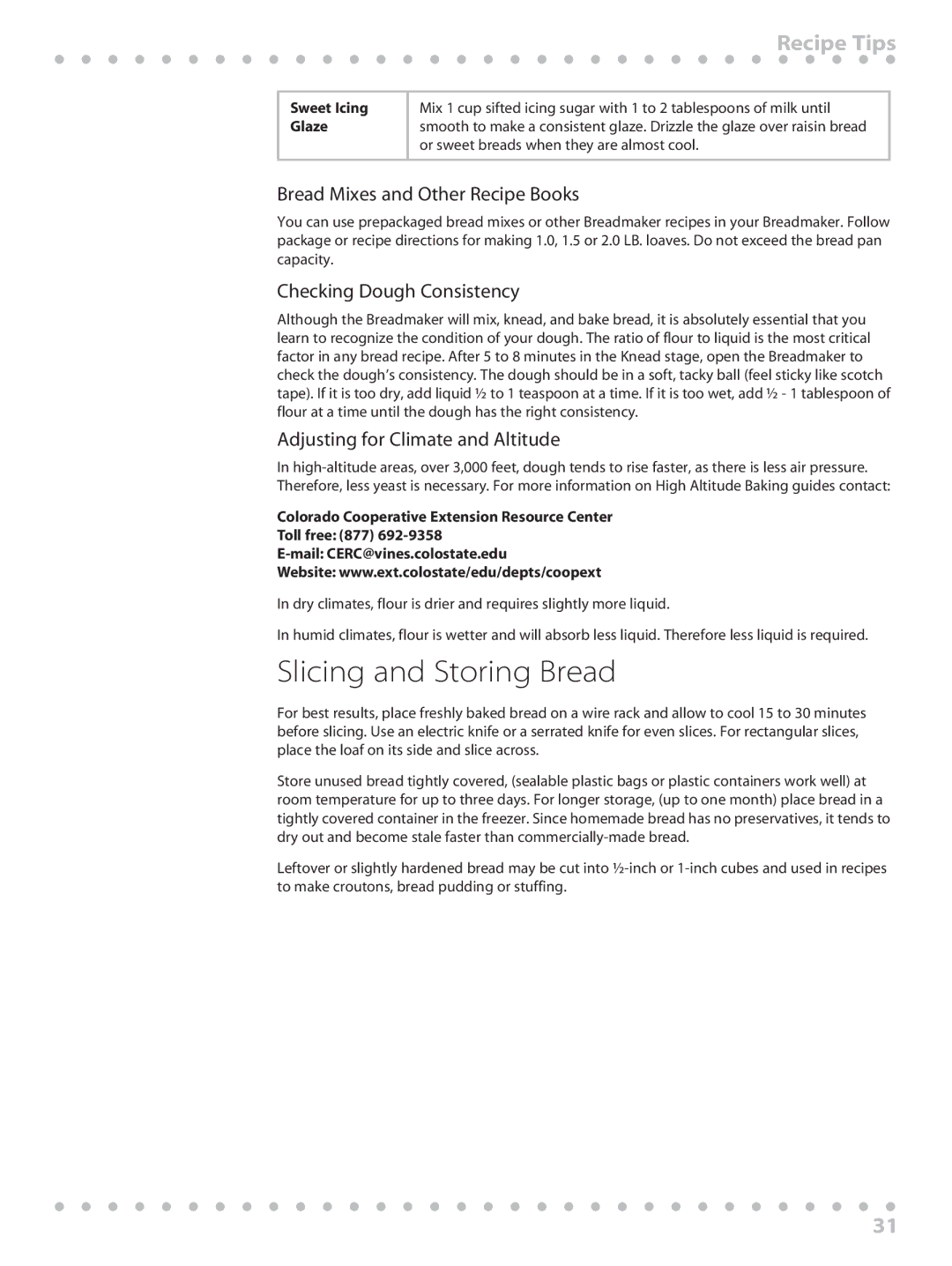WBYBM1
Table of Contents
Table of Contents
Fat Free White Bread
Buttermilk Roll Dough
Beyond Breadmaker Baking Cycles Technical Specifications
Important Safety Precautions
Important Safeguards
Short Cord Instructions
About Your Beyond Breadmaker
Special Features
About Your Beyond Breadmaker
Breadmaker that Connects to the Internet?
Before First Use
Getting Acquainted with Your Beyond Breadmaker
Breadmaker Features and Controls
Getting Acquainted with Your Beyond Breadmaker
Display Window
Control Panel
Control Panel
Programming Your Home Code
Manually Setting the Clock and Date
Using Your Beyond Breadmaker Smart Features
Manually Setting the Clock and Date
Using the Scanning Wand
To complete baking
If the Breadmaker finds the barcode in its database
If the Breadmaker does not find the barcode in its database
Adding a New Baking Program to the Breadmaker’s Memory
Using the Learn Function
Using the Learn Function
Using the Learn Function to Customize Cooking Programs
Here’s how
Programming Your Breadmaker from Your Personal Computer
Configure user Programs
Configure User Programs
Tips and Hints for Good Results
Making Dough and Baking Bread
Guidelines for Packaged Mixes
Understanding Baking Cycle
Understanding Baking Cycle
Crust Controls
Removing the Baking Pan
Inserting and Removing the Baking Pan
Basic Baking
Inserting the Baking Pan
To set the Delay Bake Timer
Using the Beyond Breadmaker’s Special Features
Using Beyond Breadmaker’s Special Features
Delay Bake Timer
Try This Mediterranean-Style Bread Recipe
Using the Pause Feature
Bake Only
Customizing Pre-Programmed Baking Cycles
Customizing Pre-Programmed Baking Cycles
Programming Your Personal Recipes
Resetting the Program & Personal Recipe Memory
To use Program a personal recipe
Know Your Ingredients
Power Loss Memory
Know Your Ingredients
Flour Storage
Working with Yeast
Other Ingredients
Conversion Chart for Quick-Acting Yeast
Rapid Settings Additional Yeast Amounts
Working with Yeast
Dry Measure
Measuring Your Ingredients
Recipe Tips
Liquid Measure
Bread Mixes and Other Recipe Books
Adjusting for Climate and Altitude
Slicing and Storing Bread
Recipe Tips
Method
Recipes
White Bread
Select White cycle
Bread Recipes
Jalapeño Bread
Sourdough Starter
Banana Bread
Sourdough Bread
Or any other variety of cake mix for flavor variation
Dried dill weed
Corn Bread
Dill Bread
Honey
Egg Bread
Fat Free White Bread
Buttermilk Bread
Maple Bread
Honey Granola Bread
Potato Bread
Peach Bread
Milk 80º F/27º C
Milk Bread
Whole Grain Bread
Select White cycle
Banana Granola Bread
Bloody Mary Bread
Whole Wheat Bread
Sunflower and Sesame Seed Bread
Select Whole Wheat cycle
Cinnamon
Egg whites room Temperature plus Enough water 80º F
Whole Wheat with Gluten Bread
Whole Wheat Cinnamon Raisin Walnut Bread
Caraway Rye Bread
Southern Barley Bread
Anadama Oatmeal Bread
Onion Rye Bread
Boiling water
Seven Grain Bread
Honey Banana Whole Wheat Bread
Whole Wheat Zucchini Herb Bread
Two Cheese Bread
Pumpernickel Bread
Yogurt Whole Wheat Bread
Hearty Nut Bread
Dairy Whole Wheat Bread
Cottage cheese
Oil optional
French Bread
Italian herb Bread
Select French cycle
Cinnamon Raisin Bread
Spiced Pumpkin Bread
Select Fruit & Nut cycle
Soy Herb Bread
Crunchy Cracked Wheat Bread
For best results select Light crust control
Add to Dispenser Sunflower seeds
Sweet Walnut Bread
White Wheat Bread
Add to Dispenser Walnuts, chopped
Add to Dispenser Fruit and nut trail mix
Dried Fruit Bread
Trail Mix Bread
Add to Dispenser Dried fruit
Soy Almond Fruit Bread
Cheese Onion Bread
Select Fruit and Nut cycle
Carrots, uncooked-grated
Egg room temperature Plusenough water 80º F
Soy Cinnamon Raisin Bread
Carrot Raisin Bread
Bread Pudding
Breaded Pineapple
Crunchy Bread Snacks
Batter Bread Recipes
All-purpose flour
Eggs, room temperature
Sweet Corn Bread
Select Batter Breads cycle
Spiced Zucchini Bread
Pineapple Coconut Pound Cake
Carrot Pecan Bread
Cheddar Loaf Bread
For Best Results
Banana Nut Cake
Jam Cycle Instructions
Jam Cycle Instructions
Select Jam cycle
Making Jam Basic Procedure
Strawberry, Blackberry, or Raspberry Jam
Blueberry, Apricot, Peach or Pear Jam
Dinner Roll Dough
Optional Glazes
Dough Recipes
Cultured buttermilk 80º F/27º C
Wheat Dinner Roll Dough
Garlic, finely minced
Egg room temperature plus
Cheezy Garlic Roll Dough
Topping Parmesan cheese, grated
Orange peel, grated
Egg room temperature plus Enough water 80º F/27º C to equal
Refreshing Roll Dough
Topping Butter, melted
Glaze Powdered sugar Milk, liquid Vanilla extract
Cinnamon Roll Dough
Filling Butter, melted
Walnuts, finely chopped
Butter, melted Brown sugar
Sticky Breakfast Bun Dough
Egg yolks Butter, cold, chipped into pieces
Brioche Roll Dough
Glaze Whisk together
Variations
French Bread Dough
Glaze Egg yolk, beaten Water
Challah Braid Dough
Topping Poppy seeds
Dehydrated onions
Creamed Soup Bread Bowl Dough
Shredded Beef Dip
Party Dip Bread Bowl Dough
Mix and chill before serving
Green onions, chopped
Shrimp Dip
Canned shrimp, drained and mashed
Mayonnaise
Almond Cherry Coffee Cake Dough
Toppings optional
Bagel Dough
Glaze Egg white, beaten Water
Banana Wheat Bagel Dough
Egg Bagels
Glaze Egg white Water
Egg yolk room temperature Oil
Soft Pretzel Dough
Variation
Pita pockets
Pita Pocket Dough
Select Pizza Dough cycle
Pizza Crust Dough
Whole Wheat Pizza Crust Dough
Pizza Dough Recipes
Foccacia Dough
Program
Pumpkin Pull-Apart Pan Rolls
Personal Recipes
Ingredients
Preheat
Challah
Grandma’s Cinnamon Rolls
Eggs, large, room temperature Salt
Dough Milk 80º F/27º C
Powdered sugar Maple flavoring Butter, melted Hot coffee
First batch
Knead Minutes
Second batch
Add to Dispenser Slivered almonds
Holiday Dried Fruit and Nut Bread
Dried cranberries
Light raisins
Method
Rosemary, fresh, sniped
Rosemary French Bread
Cleaning the Exterior
Care and Maintenance
Cleaning Precautions
Cleaning the Breadmaker
Storing the Breadmaker
Troubleshooting
Questions and Answers
Cleaning the Bread Pan and kneading paddle
Questions & Answers About Ingredients and Recipes
Troubleshooting
Breadmaker Problems
Home Hub Network Problems
Display Error Messages
Top
Baking Problems
One Year Limited Warranty
Contact Information
Contact Information
Medium
Beyond Breadmaker Baking Cycles
Light
Appendix
Med
Dark
French, 1.0 Lb Loaf
100
Fruit & Nut, Rapid, 1.5 Lb Loaf
101
102
Personal Recipes and Custom Programs
103
104
105
Custom Recipes
106
107

